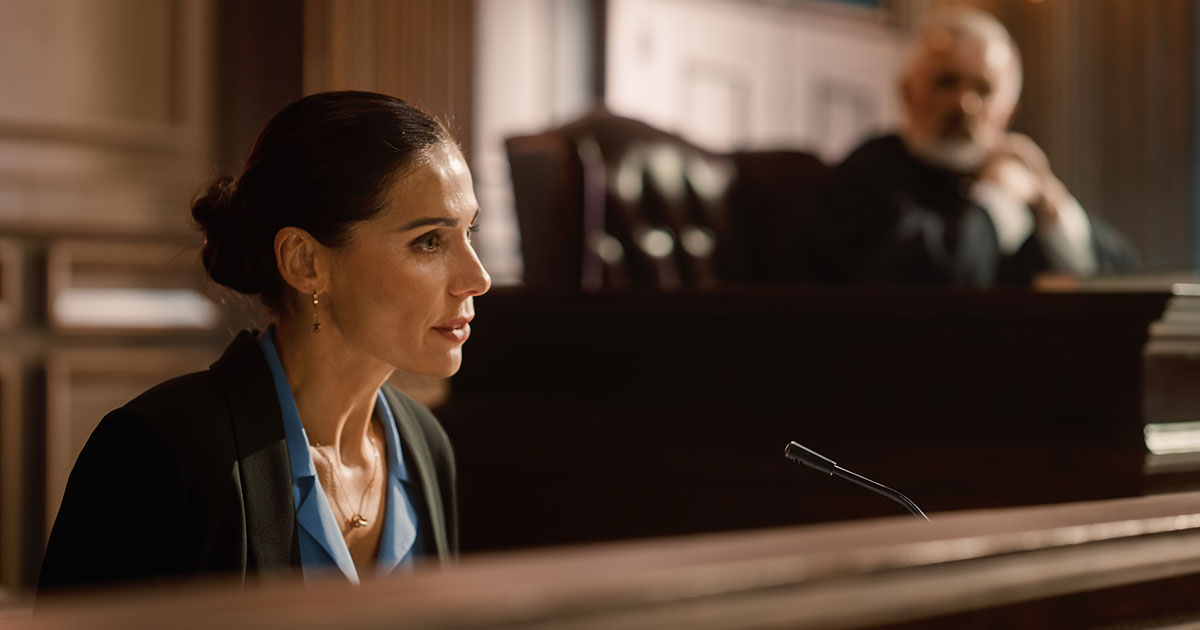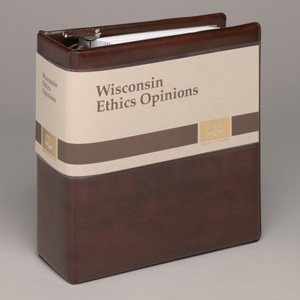
Question
I represent a client in a civil matter in circuit court. Opposing counsel notified me that they intend to testify on their client’s behalf when the case goes to trial, and I responded asserting that opposing counsel has a conflict and must withdraw. To my surprise, opposing counsel stated that they had no conflict and would not withdraw but that another lawyer from their firm would handle the trial. To me, the conflict seems obvious.
Isn’t it straightforward that lawyers must withdraw from matters in which they are likely to be witnesses?
Answer
This scenario is addressed in the recently issued Wisconsin Formal Ethics Opinion EF-25-01 “Lawyers as Witnesses.” The opinion discusses the responsibilities of the lawyer when the lawyer is likely to be a necessary witness in a matter.
What the Rule Says
Most lawyers are aware that there is some sort of rule that prohibits lawyers from being witnesses in matters in which they represent clients, but there is much confusion about the meaning of the disciplinary rule. SCR 20:3.7 reads as follows:
 Tim Pierce is ethics counsel with the State Bar of Wisconsin. Reach him by email or through the Ethics Hotline at (608) 229-2017 or (800) 254-9154.
Tim Pierce is ethics counsel with the State Bar of Wisconsin. Reach him by email or through the Ethics Hotline at (608) 229-2017 or (800) 254-9154.
“(a) A lawyer shall not act as advocate at a trial in which the lawyer is likely to be a necessary witness unless:
(1) the testimony relates to an uncontested issue;
(2) the testimony relates to the nature and value of legal services rendered in the case; or
(3) disqualification of the lawyer would work substantial hardship on the client.
(b) A lawyer may act as advocate in a trial in which another lawyer in the lawyer’s firm is likely to be called as a witness unless precluded from doing so by SCR 20:1.7 or SCR 20:1.9.”
Immediately noteworthy is that the rule doesn’t state that the lawyer has a “conflict”; rather, the lawyer is prohibited from acting as an advocate at trial of a matter in which the lawyer is likely to be a necessary witness, but the rule imposes no prohibition on acting as an advocate in the matter in pretrial and out-of-court capacities. This is because the rule is not a conflict rule but a rule intended to ensure the sound administration of matters before tribunals. EF-25-01 discusses the purposes and background of the rule:
“The general prohibition against a lawyer being both an advocate and a witness in the same trial has a long history. Even so, there has been ‘remarkable uncertainty over the reasons for the rule.’ Among the most cited rationales is the prevention of jury confusion in distinguishing the roles of an advocate who explains and analyzes evidence from a witness who provides evidence. Another is that it would harm the client, as the lawyer’s inherent client bias would make them less credible, or, alternatively, that it would unfairly prejudice the opponent by improperly bolstering the lawyer’s testimony due to their professional status. Serving in both roles could also impede the opponent’s ability to conduct cross examination. Professor Wigmore disagreed that lawyers would distort their testimony but supported the rule on the ground that, ‘the public will think they may, and that the public’s respect for the profession and confidence in it will be effectively diminished.’” (Footnotes omitted.)
Thus the rule is primarily intended to prohibit lawyers from performing both the role of evidence giver and the role of evidence arguer at trial and therefore prevent confusion on the part of the finder of fact. Our lawyer has no “conflict” and need not withdraw but is prohibited from representing the client at trial.
What Is a Trial?
Within the meaning of the rule, it is clear that the prohibition applies to jury trials. But if one of the main purposes of the rule is to prevent juror confusion, what if there is no jury? Does the prohibition in the rule apply to court trials? What about administrative hearings? EF-25-01 states:
“The committee believes that the rule clearly applies to jury trials. Less clear is whether it also applies to bench trials and administrative proceedings conducted before a hearing examiner.
“A ‘trial’ has been defined as ‘[t]he examination before a competent tribunal, according to the law of the land, of the facts or law put in issue in a cause, for the purpose of determining such issue.’ Common usage suggests it includes both jury and bench trials. The text of SCR 20:3.7 makes no distinction.
***
“Authority is split on whether SCR 20:3.7 applies to such proceedings. This lack of clarity suggests that application of the rule to non-jury proceedings should rest with the tribunal and the committee does not believe that 20:3.7(a) should apply automatically to such proceedings. The judge or other judicial official, such as a hearing examiner, is best positioned to determine whether the lawyer serving as both advocate and necessary witness would be detrimental to the proceeding.
“Therefore, a lawyer in non-jury settings – bench trials before a judge or administrative hearings before a hearing examiner – should clarify as early as possible whether the rule will be applied or not.” (Footnotes omitted.)
While the prohibition for jury trials is clear, Wisconsin lawyers should look to the relevant tribunal for a determination as to whether a specific judge or hearing officer will apply the rule’s disqualification in non-jury settings.
When Is a Witness ‘Necessary’?
Sometimes a lawyer may be called as a witness by the opposing side and there is a dispute as to whether that is a tactic aimed at disqualifying the lawyer or whether the lawyer is truly a necessary witness. EF-25-01 states:
“The current choice of language was intended to both clarify and narrow the rule, limiting its application to situations in which the testimony is ‘relevant, material, and unobtainable elsewhere.’ This suggests testimony is necessary if needed to withstand a motion for summary judgment or to dismiss. If available from other sources or only tangentially relevant, the testimony would likely not be found necessary.”
So, if a lawyer is called to provide testimony about information that is available from another source, or is not relevant and material, the lawyer is not a “necessary” witness. In the hypothetical under discussion, if the lawyer is providing favorable and admissible testimony that would not be available from another source, the lawyer is a necessary witness and may not represent the client at trial of the matter. The lawyer may still represent the client in pretrial and out-of-court proceedings, and, as set forth in subpart (b) of the rule, another lawyer from the same firm may represent the client at trial.
When Conflicts Arise
As stated above, SCR 20:3.7 is not a conflict rule. But if a lawyer likely would be a necessary witness and the lawyer’s testimony is relevant and admissible and likely would be detrimental to the client, the lawyer and the lawyer’s firm are conflicted out of the matter. The conflict exists between the lawyer’s obligation under the law to provide truthful testimony and the lawyer’s duty of loyalty to the client. Further, that conflict is imputed to every other lawyer in the firm under SCR 20:1.10(a) and because other firm lawyers would have a duty to attempt to attack the credibility of a colleague, they thus would have a conflict between their loyalty to a colleague and the client. It is extremely unlikely that any firm lawyer can reasonably conclude they can competently represent the client when confronted with such a choice and thus the conflict would not be subject to informed consent and the firm must withdraw from the matter. See EF-25-01 for further discussion of this and other questions about SCR 20:3.7.
Also of Interest
Wisconsin Ethics Opinions

What It Is
Wisconsin Ethics Opinions (State Bar of Wis. 2d ed. 2017 & Supp.) collects every Formal, Informal, and Memorandum Ethics Opinion issued by the State Bar of Wisconsin Standing Committee on Professional Ethics since 1954, along with SCR Chapter 20 and detailed indexes.
Why It Matters
Ethical questions arise in all areas of practice. This resource clarifies obligations, supports sound decision-making, and helps reduce risk in conflicts, guardian ad litem duties, online communications, trust-account management, and other complex matters.
What’s New for 2024-25
New opinions on attorney testimony and duties when leaving a firm
Revised guidance on guardians ad litem
Recent Ethical Dilemmas columns addressing practical, real-world challenges
How to Use It
Use the indexes to quickly locate relevant opinions. Reference it when evaluating client matters, advising colleagues, reviewing firm policies, or preparing CLE materials.
Next Step
Keep Wisconsin Ethics Opinions within reach. Consult it before making ethics-related decisions and order your copy today. Product: AK0049, available at marketplace.wisbar.org.
» Cite this article: 98 Wis. Law. 33-35 (October 2025).
